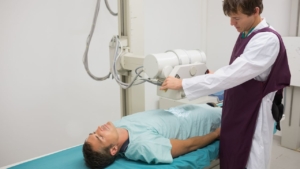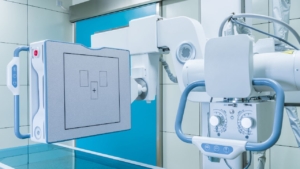Key Takeaways
- AI is revolutionizing the medical imaging field, enabling faster and more accurate diagnoses.
- Personalized medicine is becoming a reality with AI-powered imaging tools, particularly in oncology, where early detection is critical.
- Portable imaging devices are making diagnostic tools more accessible, especially in rural and underserved regions.
- Cloud-based platforms are facilitating global collaboration in medical imaging, allowing healthcare professionals to share and analyze images in real-time.
- AI-assisted technologies like ultrasound are improving early detection, leading to faster and more effective treatments.
How far has medical imaging come in the last 40 years? The answer might surprise you. From grainy, static images to today’s advanced, AI-powered scans, medical imaging has transformed the healthcare landscape in ways that were once only imaginable.
The Evolution of Medical Imaging Technology
Over the past four decades, medical imaging technology has revolutionized how healthcare professionals diagnose and treat patients. From the early days of X-rays to cutting-edge AI-enhanced imaging, this field has been in a constant state of innovation.
One of the most significant developments came in the form of digital radiography, which offered faster, more accurate imaging while reducing radiation exposure. As medical imaging equipment distributors began offering newer modalities like CT scanners, MRI machines, and ultrasound devices, patient diagnosis became more precise and less invasive.
The Role of Medical Imaging Equipment Distributors
In the medical imaging supply chain, medical imaging products suppliers play a critical role in ensuring that healthcare providers have access to the latest technology. Companies like Spectrum Medical Imaging Co. have spent the last 40 years offering state-of-the-art equipment and unparalleled service to healthcare facilities across the country.
With over four decades in the business, Spectrum X-Ray advancements include the introduction of digital X-ray systems and PACS (Picture Archiving and Communication Systems), which have streamlined the way healthcare providers store and access imaging data.
This technology has not only improved diagnostic accuracy but also enhanced patient outcomes by speeding up the decision-making process.
Top 5 Insights from Industry Leaders
1. AI is Revolutionizing Diagnosis
Michalis Papadakis, co-founder of Brainomix, emphasizes that artificial intelligence (AI) is dramatically improving how radiologists interpret medical images. AI has the ability to detect biomarkers—specific molecular indicators—that might have been overlooked by traditional imaging methods.
This advanced technology is particularly useful in diagnosing conditions like strokes, where time is crucial. AI systems can analyze CT or MRI scans faster than human experts, flagging critical issues for immediate action, potentially saving lives.
The rapid rise of AI is revolutionizing diagnostic tools and bringing a new level of accuracy and efficiency to medical imaging, as echoed by industry leaders from companies like GE Healthcare and Siemens Healthineers. This shift towards AI-driven diagnostics is transforming routine healthcare, reducing diagnostic errors, and enabling earlier intervention for critical conditions.
2. Personalized Medicine Through Imaging
Khalid Shaikh, the founder of Prognica Labs, has been a vocal advocate for the role of AI in driving personalized healthcare. Medical imaging, enhanced by AI, is moving towards a future where each patient’s diagnosis and treatment plan will be uniquely tailored.
For instance, in cancer diagnostics, AI can analyze complex imaging data to provide insights into tumor characteristics and suggest targeted therapies.
By making sense of huge data sets, AI can predict how patients might respond to certain treatments, allowing doctors to adjust protocols accordingly. This marks a shift from one-size-fits-all approaches to treatment toward more patient-specific care, improving outcomes across various medical fields, including oncology and cardiology.
3. Portable Imaging Devices are Transforming Accessibility
The development of portable medical imaging devices has brought unprecedented access to diagnostic tools, especially in remote and underserved areas. As highlighted by Siemens Healthineers and Philips Healthcare, portable imaging solutions, such as handheld ultrasound machines, are making it possible to perform high-quality imaging in rural clinics or even at patients’ bedsides.
These devices are compact, easy to use, and can transmit data to specialists in real-time, making expert consultations possible without patients needing to travel to large medical centers. Portable imaging devices are also critical in emergency settings, where quick access to diagnostic tools can make a life-saving difference.
By reducing the need for expensive, centralized imaging equipment, portable devices are democratizing healthcare, ensuring that high-quality diagnostics are available everywhere.
4. Cloud-Based Imaging Solutions Enhance Collaboration
QMENTA, a leading cloud-based imaging platform, points out that cloud technologies are facilitating better collaboration between healthcare professionals.
In the past, sharing medical imaging data between radiologists, specialists, and researchers was cumbersome, requiring physical copies or complex data transfers. Now, cloud platforms allow real-time access to medical imaging data from anywhere in the world, streamlining communication between care teams and enabling collaborative decision-making.
This is particularly important for multi-center clinical trials and large healthcare networks, where imaging data can be accessed and analyzed simultaneously by multiple experts. Cloud solutions also offer advanced security features, ensuring patient data is protected while still being accessible to those who need it most.
5. AI is Accelerating Critical Disease Detection
AI is not just improving diagnostic accuracy—it’s speeding up the entire diagnostic process. Companies like Caption Health are leading the way in AI-assisted ultrasound technology, which is proving to be a game-changer in early disease detection. For conditions like heart disease, where early diagnosis is crucial for successful intervention, AI-enhanced imaging can rapidly identify abnormalities that might otherwise go unnoticed.
This technology is particularly beneficial in resource-constrained settings, where there may not be immediate access to specialists. AI-powered tools help frontline healthcare providers make better decisions faster, improving patient outcomes. Early disease detection, made possible by AI, reduces the burden on healthcare systems by allowing for early, less-invasive treatments, further enhancing the overall quality of care
The Future of Medical Imaging
So, what does the future of medical imaging look like? Experts predict a healthcare environment where imaging technology is even more integrated into everyday medical care. AI will likely play a dominant role, with algorithms providing diagnostic support for clinicians, enhancing accuracy, and speeding up the entire process.
Advancements in 3D imaging and portable devices are also expected to transform how and where imaging takes place. Instead of having to visit specialized imaging centers, patients may be able to get high-quality scans from mobile units or smaller, more efficient machines at their local healthcare facility.
Why Spectrum Medical Imaging is Leading the Charge
For over 40 years, Spectrum Medical Imaging Co. has remained a trusted medical imaging equipment distributor and medical imaging products supplier. Their commitment to providing innovative solutions, including Spectrum X-Ray advancements, has allowed healthcare facilities to stay on the cutting edge of technology.
Whether you’re looking for a complete digital X-ray system or state-of-the-art imaging supplies, Spectrum Medical Imaging Co. offers the expertise and products that can enhance the level of care in any medical setting.
Partner with Spectrum Medical Imaging Today!
Looking to equip your facility with the best in imaging technology? With four decades of experience and a focus on future-ready solutions, Spectrum Medical Imaging Co. is your trusted partner in transforming healthcare technology. Contact us today and elevate your facility’s medical imaging capabilities!




